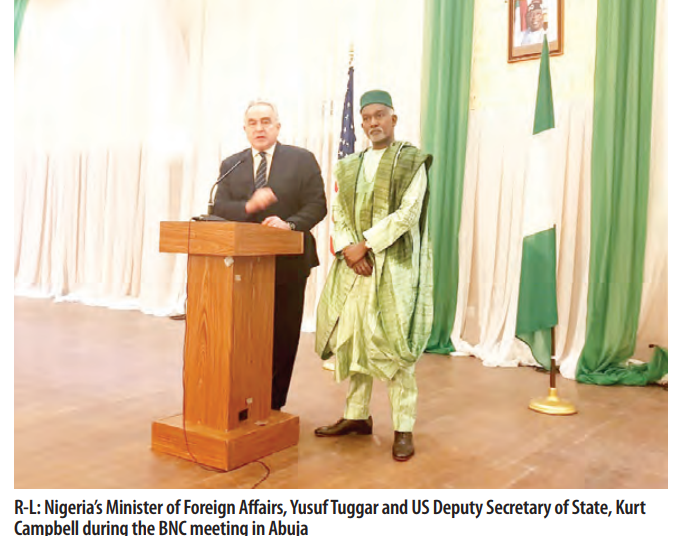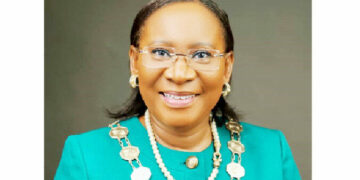The United States and Nigeria have once again restated commitment to strengthen collaboration in varied areas for mutual benefits.
This was the crux of the two-day 6th edition of the US-Nigeria Binational Commission (BNC) which was held between Monday and Tuesday in the Nigerian capital, Abuja, with the theme “Partnership for Mutual Benefit and Development.”
During the discussions both countries also made commitments to increase bilateral trade, invest in energy, agriculture and technology including Artificial Intelligence (AI) as well as increased their efforts to fight the scourge of terrorism in Nigeria and in neighbouring countries.
Nigeria’s Minister of Foreign Affairs, Yusuf Tuggar told a news conference that the collaboration has assisted Nigeria to “make significant progress in degrading the Boko Haram terrorists in the northern part of Nigeria.”
Tuggar said that although there is the challenge of banditry, which is a fall out of the Boko Haram terrorist activities, the Nigerian government is containing this challenge, adding that with the US support, the matter will be brought to an end.
The Minister also emphasized the need for economic development, stressing that the government of President Bola Tinubu is focused on offering employment to the people of Nigeria. He said “we are focusing on the use of technology to create jobs and to educate the youth”.
The US Deputy Secretary of State, Kurt Campbell, told the conference that the BNC was fruitful. He said “Energy is a huge part of our relationship, agriculture has enormous potential. We will work much more closely on technology and expand the volume of trade and build people – to-people commercial and technological links between our two countries.
“We will step up our efforts in security because the security challenges do not reside in Nigeria, they are regional and global and we are containing them as well. Nigeria is a natural partner and indeed we have ambition to step up our engagement in this arena not just with respect to local areas but the regional ones as well.”
One other significant part of the BNC was the request by the Nigerian government that the US assist the country in returning huge sums of money stashed away in financial institutions in the US and other Western countries especially the funds reportedly looted by Nigeria’s former military ruler, late General Sani Abacha and his family.
Nigeria made this appealed on Monday through the Permanent Secretary of the Ministry of Foreign Affairs, Adamu Lamuwa, who emphasized the need for increased support from the US to return stolen wealth.
During the 5th edition of the BNC in Washington DC in 2020, the Nigerian government got the commitment of the US government and the Government of Jersey to return $308 million that late Abacha stashed in US banks using his cronies over the years.
The funds were laundered through the US banking system and then held in bank accounts in Jersey in the name of Doraville Properties Corporation, a BVI company, and the name of the son of the former Head of State of Nigeria.
The monies were laundered by his family, including his sons Ibrahim and Mohammed, and several close associates. The laundering operation extended to the United States and European jurisdictions such as the UK, France, Germany, Switzerland, Lichtenstein and Luxembourg.
Recall that on January 16 2024, a Royal Court in Jersey, Channel Islands, reportedly ruled that stolen assets worth £6.9m ($8.9m) be repatriated to Nigeria.
Lamuwa said, “I would like to appreciate the fallout of the Democratic National Convention held in February 2020 in Washington, DC. The governments of Nigeria, the United States, and Jersey signed a tripartite agreement to return to Nigeria the sum of over $308 million of funds stolen from the country.
“I would also urge the U.S. to do more because $308 million is a meager amount when you look at the resources that Nigeria has lost over the years due to illegal transfers of funds from the country.
“The Nigerian government has committed to using these funds for the benefit of all Nigerians, as agreed with development partners. These funds are aimed at developing infrastructure, particularly projects in roads, schools, education, and other sectors of the economy that require this substantial return.”
He added that the funds would be channeled to infrastructure development, focusing on projects such as roads, schools, education, and other vital sectors requiring substantial investment.
Despite the US efforts to return stolen wealth to Nigeria, there are disturbing reports that some past and present leaders in Nigeria are allegedly finding ways to launder money from Nigeria to other parts of the world. The biggest task lies with the anti-graft agencies in Nigeria to tighten the noose against economic thieves and find a more empirical method to stop them, from stealing the nation’s wealth even before the think of stashing them abroad.
The BNC is important in the area of security because without it achieving prosperity will be difficult. Insecurity endangers human rights and threatens businesses and investment.
The north east region of the country terrorized by Boko Haram is still grappling with consequences of terrorism and now requires massive rehabilitation efforts to put it back to shape. Terrorism has also multiplied Nigeria’s security challenges to include banditry, and piracy which pose significant threats to its population.





